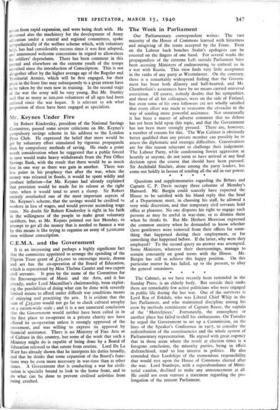The Week in Parliament
Our Parliamentary correspondent writes : The vast majority of the House of Commons learned with bitterness and misgiving of the terms accepted by the Finns. Even on the Labour back benches Stalin's apologists can be counted on the fingers of one hand. For several weeks the propagandists of the extreme Left outside Parliament have been accusing Ministers of endeavouring to embroil us in a war with Russia. This view finds very little acceptance in the ranks of any party at Westminster. On the contrary, there is a remarkably widespread feeling that the Govern- ment has been both dilatory and half-hearted, and Mr. Chamberlain's assurances have by no means carried universal conviction. Of course, nobody doubts that his sympathies, and those of all his colleagues, were on the side of Finland, but even some of his own followers are not wholly satisfied that every effort was made to overcome the obstacles in the way of sending more powerful assistance. Not unnaturally it has been a matter of adverse comment that no debate has yet been held upon this topic, and that the Government has not been more strongly pressed. There are, however, a number of reasons for this. The War Cabinet is obviously better qualified than any private member can possibly be to assess the diplomatic and strategic difficulties. Conservatives are for this reason reluctant to challenge their judgement. The Labour Party, while condemning Soviet aggression as heartily as anyone, do not seem to have arrived at any final decision upon the course that should have been pursued. Sir Archibald Sinclair, alone among the party leaders, has come out boldly in favour of sending all the aid in our power. * *






















































 Previous page
Previous page